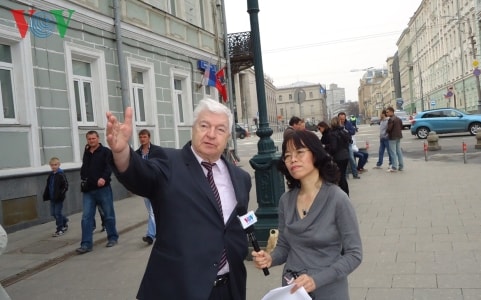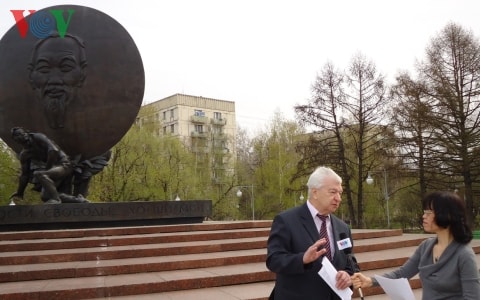President Ho Chi Minh's testament contains immortal words.
This is the opinion of Mr. Evgeni Kobelev, a Vietnamese researcher who has studied and worked in Vietnam for many years. Mr. Kobelev also met and has many memories of President Ho Chi Minh and has written many articles and books about him.
On the occasion of the 45th anniversary of President Ho Chi Minh's death and his sacred Testament, Mr. Kobelev discussed his impressions and feelings for President Ho Chi Minh.
 |
| Mr. Kobelev in an introduction about Ho Chi Minh's imprints in Moscow |
PV:As a Vietnam scholar, you have written many works about President Ho Chi Minh. Could you please tell us your memories of President Ho Chi Minh?
Mr. Kobelev:I first came to Vietnam in 1965 and spent 2 years as a Vietnamese language student at Hanoi University and 3 years as a reporter for the Soviet News Agency (TASS).
The first time I met President Ho Chi Minh was in 1959, when Hanoi city organized Communist Labor Day, planting trees at Bay Mau Lake. Participating in this activity were many students of Hanoi University of Science and Technology, including foreign students.
While we were working, President Ho Chi Minh appeared without a large entourage, only two people. He joined us in planting trees. This made a strong impression on me, because a President had joined in planting trees with students.
The second time I met him was in 1961, when I returned to Moscow and continued my studies at Moscow State University (MGU), but because at that time I was the only one who had graduated from the Vietnamese language course at Hanoi University, when the Congress of the Communist Party of the Soviet Union took place, they invited me to be a direct interpreter there.
The Vietnamese delegation attending the Congress was led by President Ho Chi Minh. When President Ho Chi Minh delivered his welcoming speech to the Congress, I translated it into Russian. This was an unforgettable event for me.
Then, from 1964 to 1967, when I was a TASS correspondent in Vietnam, I had many opportunities to listen to President Ho Chi Minh's speeches and meet him when he visited the Soviet Embassy...
He loved children very much and often gave them candy and cakes. A very memorable event was in 1966, at the congress of the brave soldiers who defeated the Americans, many Orders and Medals were awarded to the heroes.
After presenting the medals, he went up on stage and said a few words, but I couldn't understand everything because he spoke Nghe An dialect, so I had to ask a Missile soldier sitting nearby to "translate" into Hanoi dialect (laughs).
I then translated into Russian to publish this very good speech of his. It was a speech that he gave to his close people, not a public speech, in which he said, we fight, work for the country, for the people and therefore America will never defeat the Vietnamese people.
There was an event that also left a very strong impression on me, which was President Ho Chi Minh's radio speech on the occasion of the anniversary of the signing of the Geneva Peace Agreement, in which he said: "The war may last, Hanoi and Hai Phong may be destroyed... But the American imperialists cannot subdue the Vietnamese people." This is something that I will always remember.
PV:Through such contacts with President Ho Chi Minh, what remains in you about Ho Chi Minh as a person?
Mr. Kobelev:Most importantly, Ho Chi Minh was a very good person. In Vietnam, people did not call him “Chairman”, “Comrade”… but called him “Uncle”, because to everyone, he was like a close person.
He was not simply a communist leader but a MAN with a capital letter. In the 1970s, when I was collecting documents to write a book about him, for 3 years, I had a feeling that every day I was in contact and talking with a MAN with a capital letter. This brought back a very strong impression that I will never forget, the impression of the times I met Ho Chi Minh.
We have published books about him such as: “Russians recall Ho Chi Minh”; and my personal book has been translated into Vietnamese “Comrade Ho Chi Minh”… This book is very valuable to everyone. It was published in 2010, on the occasion of the 90th anniversary of Nguyen Ai Quoc – Ho Chi Minh’s first visit to Moscow.
This book is also very valuable when at the Conference organized by Ho Chi Minh Institute on this occasion, with the presence of about 50 scholars from America, England, France, etc., this book was introduced and presented. I am very touched that this book is so highly appreciated.
PV:In the book about President Ho Chi Minh, you also mentioned the content of the Will that President Ho Chi Minh left to the Vietnamese people before he passed away. This year we also celebrate the 45th anniversary of his Will. So what do you think about the content of this Will?
Mr. Kobelev:I have written many times about President Ho Chi Minh's Testament and of course, in this book of mine, "Comrade Ho Chi Minh", which was published in Russian and translated into languages such as Vietnamese, English, Lao, Mongolian, Kazakh, Bulgarian and many others...
This is a very impressive Will because it was written not only by an outstanding politician but also a message from a relative to all his people, his nation and the whole world.
 |
| Mr. Kobelev and PV at the Ho Chi Minh monument in Moscow |
President Ho Chi Minh's will, after being announced in Vietnam, was immediately translated into Russian and published in the Truth newspaper, and it had a strong impact on the emotions of many people.
I still clearly remember that, at that time, both the reporters and I, who were then cadres of the Central Committee of the Communist Party of the Soviet Union, were extremely moved by His Testament because it contained immortal words.
President Ho Chi Minh was very interested in the international communist movement at that time. Therefore, after the publication of this Testament, people all over the world held a sentiment towards Ho Chi Minh as a very special person.
PV:We also know that in Moscow and Russia there have been many imprints of Ho Chi Minh. We also know that you are continuing to research about Vietnam and President Ho Chi Minh. Can you tell us about your plans in the near future to have more imprints of Ho Chi Minh in Russia and Moscow?
Mr. Kobelev:Ho Chi Minh visited Moscow many times. On Ho Chi Minh Square in Moscow, there is a statue of him and every year, on May 19, Russians from movements and organizations in solidarity with Vietnam such as the Friendship Association, the Peace Organization... together with the Vietnamese Embassy in Russia still come here to lay flowers.
In addition, on Mokhovaya Street near Red Square there is a bronze plaque marking the place where President Ho Chi Minh once worked for the Communist International; In Vladivostok, at the train station, 3 years ago a commemorative plaque was installed stating: "At this station, in the 1930s, Ho Chi Minh often traveled from here to Moscow."
In the coming time, on the occasion of the 125th anniversary of President Ho Chi Minh's birthday, we have two ideas: First, we will put up a memorial plaque at the Vietnam and ASEAN Research Center of the Far East Institute and build a Ho Chi Minh Memorial Room to introduce all the images, books and newspapers about him. We have also agreed with the Ho Chi Minh Academy, the unit with which our Institute has signed a 10-year Cooperation Agreement to implement this idea.
The second idea is that we have proposed to the Moscow government to put a memorial plaque on the building that is currently the Vietnamese Embassy in Moscow, where President Ho Chi Minh visited most often in the late 1950s and early 1960s, stayed there, or visited and met with officials and staff of the Vietnamese Embassy in the Soviet Union. This is a very good thing to do because this building is very worthy of becoming a place to preserve memories of Ho Chi Minh.
According to VOV






